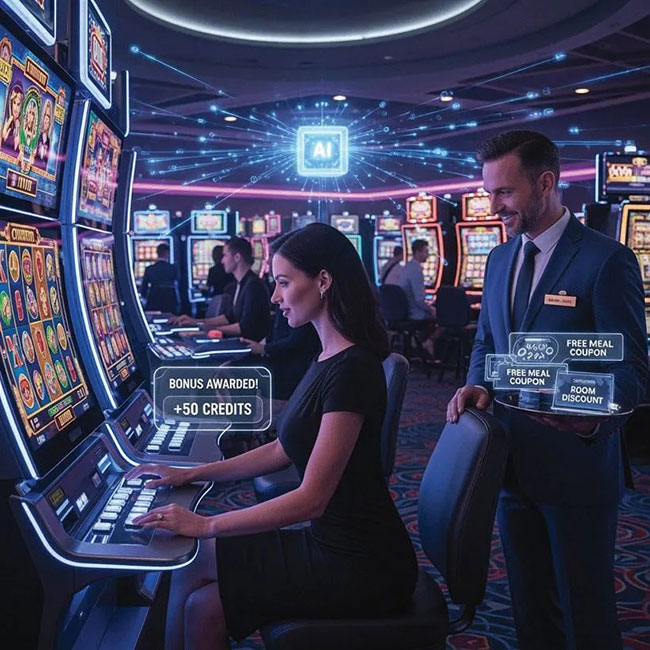THE NEW CLUB
New technology is changing the player’s club in ways you never imagined
By Frank Legato
The player’s club is in the middle of its next evolution. Technology is changing what casinos can do through their loyalty clubs, and the changes will definitely benefit the player. The changes can be traced to how the systems record your play, typically done in today’s casino world with a plastic mag-stripe club card.
Casino management systems, also known as player tracking systems, first appeared in the mid-1980s, not long after slot machines overtook table games as the biggest moneymakers on the floor. Longtime casino enthusiasts will remember when coin coupons were the main reward issued by the clubs. You would play your session on the slots or video poker machines, and perhaps a week later there would be an envelope of coin coupons in your mailbox.
They were called “bounce-back coupons,” because you had to revisit the casino to cash them out at the cage. Casinos eventually found out, though, that a return visit didn’t necessarily mean return play. People who played a lot during the 1980s and 1990s and earned coin rewards from several casinos would make special trips to their favorite casinos every few weeks to make “coupon runs,” cashing out their coin coupons and taking the cash with them instead of putting it back into the machines.
Casinos didn’t like that, and by the first decades of the 21st century, coin coupons had been replaced by “free play,” which only appeared when you inserted your card in a machine—and, importantly, had to be played through at least once before the bonus credits could be cashed out. Now, you were guaranteed to play on your return visit.
Room and food comps, of course, are still one of the main rewards for extended play. However, technology has changed the slot club, and is causing a new evolution in player rewards. Years ago, several of the clubs began rewarding players directly at the machine—not only with cash-back and free play, but with special bonus games that played out right on the machine’s screen.
Bonuses at the machine were generated automatically through the tracking system once a player would reach a point threshold through his or her play. But rewards at the machine are getting better, and the entire slot experience could soon change thanks to two words—artificial intelligence.

In fact, AI is not just on the horizon; it’s here. There are several casino management systems that are capable of retrieving “spin-level” data—information flowing to the back- end system every time you hit the spin button on your slot. The operators place play thresholds, loss parameters and other measuring tools into the system, and AI will trigger a bonus or alert a casino host when intervention is needed.
With AI in place, if you wager a lot within a short space of time, you may automatically get a bonus award sent right to your credit meter. If you lose money on the slots at a rate higher than you normally do—yes, your play history is already logged in and accessible— the system can intervene so your overall casino experience isn’t negative.
How that happens is up to the casino. The system may trigger bonus credits. A host may be alerted to visit you at your machine with a free meal coupon, a room discount or some other perk to take the sting out of a losing slot session.
Casinos are using AI to build relationships with their players. They have information on what you like to do away from the casino as well as the games you play. That loyalty card follows you around the modern resort. That host who visits you during a losing session may be equipped with a perk based on what you’ve done in the past: Here’s a spa treatment. Maybe show tickets for your favorite performer. We know you frequent this restaurant, so here’s a meal on us.
Even cooler stuff is on the way. The newest player loyalty systems are using technology that is already out in the consumer market, like facial recognition. Some casinos already give you the option of using your smartphone to log in for a slot session—dispensing with that plastic card that you forget half the time anyway.
Soon, you’ll be able to sit down at a slot machine and the game will recognize you. Facial recognition technology will log you in automatically, and log you back out when you quit playing. The latest system capabilities will even let you fund your play, transferring money from your bank account directly to the machine.
Imagine sitting down at a slot machine, getting a message welcoming you to the casino, and logging a wagering balance to the machine from your bank account. Instead of stopping to print out a new player’s card, then to the ATM for money, then to the slot floor, you just sit down and play.
It’s not imagination. It’s not the future. It’s here now. Or, if your casino is proactive, it soon will be.

Florida Law Spurs Slot-Related Lawsuit
The pairing of horse racing and slot machines has created a bit of a stir in Florida. Gulfstream Park Racing Association has filed a lawsuit against the Florida Gaming Control Commission challenging a 2021 law that requires the track to keep running races in order to preserve the right to operate slot machines in the state. Gulfstream is one of just two tracks in the state that still stage thoroughbred races, along with Tampa Bay Downs.
Prior to 2021, state law mandated that tracks must hold races or jai alai games to operate cardrooms and slot machines, with only the latter allowed in Miami-Dade and Broward counties. That was scrapped for harness-racing and quarter-horse tracks and jai alai facilities in 2021. However, thoroughbred tracks were required to continue with races, an exception because of the large thoroughbred industry in the Ocala area, according to WLRN.
Florida voters also approved a constitutional amendment in 2018 to outlaw greyhound racing and former dog tracks were allowed to house casino gaming instead. The lawsuit argues that the law puts Gulfstream at a disadvantage over other racing venues in the state, where other tracks within Miami- Dade and Broward can offer slots without having to run races.
 The “decoupling” provision “thoroughly undermines the ability of Gulfstream to compete with other pari-mutuel companies authorized to operate slot machines, subjecting it to irrational, different treatment with its live racing requirement,” according to the lawsuit.
The “decoupling” provision “thoroughly undermines the ability of Gulfstream to compete with other pari-mutuel companies authorized to operate slot machines, subjecting it to irrational, different treatment with its live racing requirement,” according to the lawsuit.
Gulfstream also argues that the provision violates the Florida constitution’s prohibition against “special” laws or those geared toward “particular persons or things” or “grant of privilege to a private corporation.”
“It is clear not only that [the law] is a special law, but that it is a law targeting Gulfstream specifically, as the current—and likely only ever to be—thoroughbred permitholder with a slot machine license,” the lawsuit notes. “Gulfstream alone faces exorbitant fines, the loss of its license, the revocation of its permit, and potential criminal prosecution should it operate its slot machines while failing to maintain a full schedule of live racing.”


